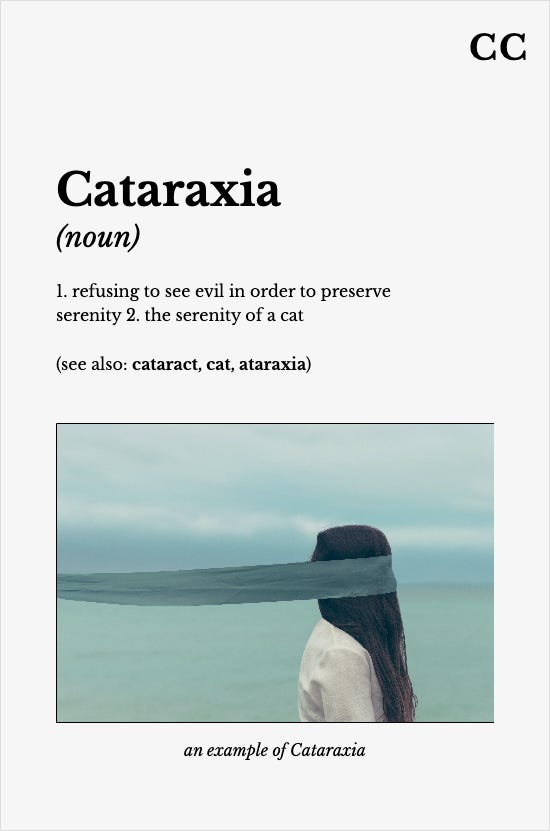Thank you again, patrons, for your support. Here is the newest addition to your ever-blossoming vocabularies. I’ve returned to making them myself because Chat GPT is honestly not good at coming up with neologisms.
I did write a Tuesday Scribbleland post but then chose to take it down. It dealt with the sensitive topic of sexual assault, and I don’t quite feel ready to write publicly about that at this point in my life. But I hope that you enjoy this in its stead!
Cataraxia is a common affliction. So often, we welcome cloudiness in our vision because it removes the burden of clarity. The truth hurts. When Oedipus discovered the truth of his life—that he had murdered his father and married his mother—his response was to gouge out his eyes.
In the Hellenistic era, practitioners of Stoic philosophy sought ataraxia, a state of profound serenity that kept its possessor calm in all circumstances. Though it could be seen as a defense mechanism, ataraxia was preceded by a noble willingness face the horrors of life with clearsighted vision. It was attained by tapping into a character well-trained in the practice of virtue.
The modern age, by contrast, is characterized by cataraxia, an ill-disciplined, cowardly, deceptive, irresponsible blindness—a tendency not to deal with reality but instead to drug oneself into oblivion, to surrender the greatest beauty in order to escape the greatest pain.
There is a big difference between the two. One is noble (if, perhaps, unattainable), the other ignoble.
I believe that every single one of us will experience something in our lives that forces us to make the choice between heroic clear-sightedness and willful ignorance—a choice between ataraxia and its cheap counterfeit, cataraxia.
My husband and I just finished reading Tara Westover’s Educated, a memoir that traces the journey of a woman from her childhood in the junkyard of her Doomsday-prepping father to the earning of her PhD in the hallowed halls of Oxbridge. One of the main conflicts of the story centers around Tara’s relationship with her abusive older brother, Sean. Perhaps the most heartbreaking insight of the whole book occurs when Tara confronts her mother about Sean’s actions, only to discover that her mother knew about it all along but chose to pretend it was not happening. This sort of slant-eyed vision—knowing but willing yourself not to know—is the essence of cowardice, an insidious and self-protective form of deception. The woman who was supposed to notice what nobody else noticed saw the truth—and abdicated her responsibility as mother. The father, when he heard the reports, refused to believe the victim and cast her out of the family in order to protect his relationship with the abuser.
As the only creatures endowed with self-reflective consciousness, we are the only ones who feel a prickling up our spines when we get too close to baring an uncomfortable truth. When this happens, we must not choose to turn our eyes away. Fear of truth leads to a perpetual refusal to engage with reality. It leads to discussing stamp collections and always listening to music through an AirPod in one ear. It leads to “friendships” in which you realize, after a decade of knowing a person, that you don’t know whether his parents are alive, or that he used to be a professional dancer. It leads to rewatching sitcoms and binging snacks whenever you feel a touch of sadness. It leads to superficiality, anxiety, loneliness, and the constant feeling you are walking on eggshells, frightened that if you trod too hard, they will crack and you will plummet into a terrifying abyss.
Under the drug of self-imposed cataraxia, life will become small and crabbed and wizened. I do not want that. I want a life as wide as the Illinois sky stretching in a blue expanse over infinite rows of corn. I want a life that, because it dives into the depths of horror, can soar into the heights of sublime love and gratitude.
I guess I should end by saying this philosophical exhortation was spurred by a recent talk on how to protect children from sexual predators. It is sad to hear how dirt-common it is for people to sacrifice the safety of innocent little kids in order to maintain a facade of normality and avoid awkward confrontations.
We talk a lot about injustice and how to defeat it in this society, but how do we have any right to talk about it when we turn a blind eye to the evil in our own houses?
First, choose to see the evil close to home. Once we’ve learned that, we can move onto the business of dealing with it on a larger scale.
Prompt: What hard truths have you chosen to ignore?
p.s. You can use the prompt for your journal writing, or simply as a breakfast conversation topic over coffee. Have a great weekend!
xo,
Amelia





See also catatonia!